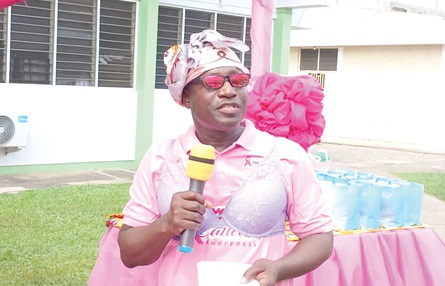Survivors of breast cancer in the Eastern Region have appealed to the government to include the treatment of all aspects of the cancer under the National Health Insurance Scheme (NHIS).
They said it would enable women battling with breast cancer to have access to treatment irrespective of their financial status.
Currently, the treatment of breast cancer is not fully covered by the NHIS, and that has led to many deaths.
The survivors, numbering 200, drawn from towns and communities in the Eastern Region, made the appeal at a breast cancer awareness programme in Koforidua in the Eastern Region.
The event was sponsored by Nationwide Medical Insurance, a private insurance company, organised by the Judith Ellen Awuah-Darko Foundation in collaboration with the Eastern Regional Hospital.
Before the education, the breast cancer survivors and staff of the three institutions embarked on a health walk on the principal streets of Koforidua.
Financial difficulties
The women, some of whom narrated the extremely difficult situation they encountered when undergoing treatment due to financial difficulties, stated that free treatment under the NHIS was the only option for all patients to be treated.
![]()
Breast cancer survivors in Koforidua
They said there were lots of women, particularly in rural communities, who could not pay for treatment of the disease.
That, they said, killed some of them, while the fortunate ones had their breasts cut off.
Two of the survivors, Dr Schampaign-King and Patience Doryo, who spoke on behalf of their colleagues, said women whose breasts had been cut off entirely to save their lives had been marginalised by society, but that should not be so.
Dr Schampaign-King, for instance, said it was not the fault of any woman to be affected with breast cancer.
NHIS surgery
The Clinical Director of the Eastern Regional Hospital, Dr Foster Amponsah-Manu, said the NHIS covered breast cancer surgery, but Chemotherapy and Radiotherapy were not covered.
He was, however, hopeful that the NHIS would gradually cover all the treatments for the disease.
Dr Amponsah-Manu also debunked the assertion that those who undergo breast cancer surgery usually die.
“Fifteen years ago, we performed surgery on a number of women battling breast cancer, and those women are still alive.
Those who pass away are usually patients who do not seek treatment early. Early detection ensures early treatment.
The hospital cannot refuse any breast cancer patient, whether they arrive early or late, but it is in the patients' best interest to seek treatment early," Dr Amponsah-Manu added.
He appealed to the survivors to continually educate the public on all aspects of the disease, since they were in the best position as breast cancer survivors to educate the public.
Contracting disease
The Deputy Eastern Regional Director of the Ghana Health Service (GHS), Dr Samuel Bortier Borlabi, for his part, advised breast cancer survivors to be conscious about the disease and continue to propagate the messages on prevention and treatment in their communities.
He advised those with the disease not to go for herbal treatment, which, he said, could lead to complications.
Dr Borlabi further urged husbands to support their wives who were suffering from breast cancer and always accompany them to the hospitals for medical treatment.
Writer's email haruna.wunpini@graphic.com.gh

